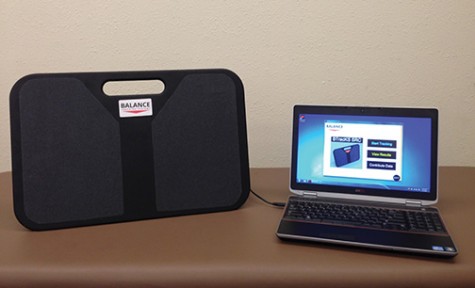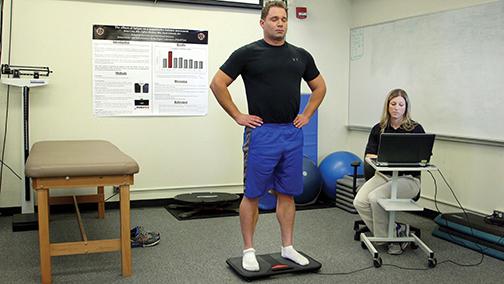According to the Center for Disease Control approximately 1.6 to 3.8 million concussions occur in sports and recreational activities annually. With the goal to make concussion testing more accurate than subjective tests and more affordable for school and athletic teams, a group of biomechanics researchers at San Diego State has developed BTrackS, a device that measures an athlete’s balance to help determine whether he or she has suffered a concussion.
Manufactured by Balance Tracking Systems, BTrackS is a portable medical device that measures postural sway. Injured athletes stand on the board with their eyes closed while the device provides objective data related to the athlete’s balance. Athletic trainers can then compare the data with previously recorded data that was gathered when the athlete was healthy.
While similar balance testing devices used by leading hospitals and medical centers cost thousands of dollars, BTrackS costs about $800.
“We think we have the best way of doing balance testing and now it’s affordable for people,” assistant professor of exercise and nutritional science and founder of Balance Tracking Systems Daniel Goble said.
With the help of SDSU’s Zahn Innovation Center, an incubator that supports SDSU innovators and aspiring entrepreneurs as they transform their ideas into products and companies, Goble worked with business and engineering expertise to develop BTrackS and turn his idea into the national business it is today. Currently BTrackS is used at 10 colleges and high schools in San Diego as well as in other states including Wisconsin, Virginia and Arkansas. By the end of the semester, Goble hopes to triple the number of schools and teams that use BTrackS.
Cathy Pucher, executive director of the Zahn Innovation Center, said BTrackS was one of the first businesses to come out of the center. All students, faculty and staff must apply to work with the incubator and Pucher said Goble’s idea of affordability stood out in reviewing his application.
“We all know concussions are becoming a major problem and people are limited by the cost of the equipment today,” Pucher said. “[Goble] is removing that cost barrier and making the equipment more accessible to more people.”
Although BTrackS is currently on the market, the Balance Tracking Systems team is constantly making improvements. Brian Gehriny, the engineer for BTrackS and a graduate of the electrical engineering master’s program at SDSU, is responsible for building the device and designed the original series of prototypes and the unit that is in production today.
“We’re always doing updates,” Gehriny said. “We find what is going to fail, make it stronger and replace it with something else.”
Although, the present focus of BTrackS is to use it to test athlete concussions, Goble believes it can also be used for other reasons, such as tracking early symptoms of Huntington’s disease and working with patients with Multiple Sclerosis.
“Testing balance is great because anything that goes wrong with the brain will typically manifest itself as increased body sway,” Goble said.
 This article has been changed. It previously stated that assistant professor of exercise and nutritional science and founder of Balance Tracking Systems Daniel Goble said, “We think we have the best way of doing concussion testing and now it’s affordable for people.” The Daily Aztec apologizes for any confusion this may have caused.
This article has been changed. It previously stated that assistant professor of exercise and nutritional science and founder of Balance Tracking Systems Daniel Goble said, “We think we have the best way of doing concussion testing and now it’s affordable for people.” The Daily Aztec apologizes for any confusion this may have caused.










